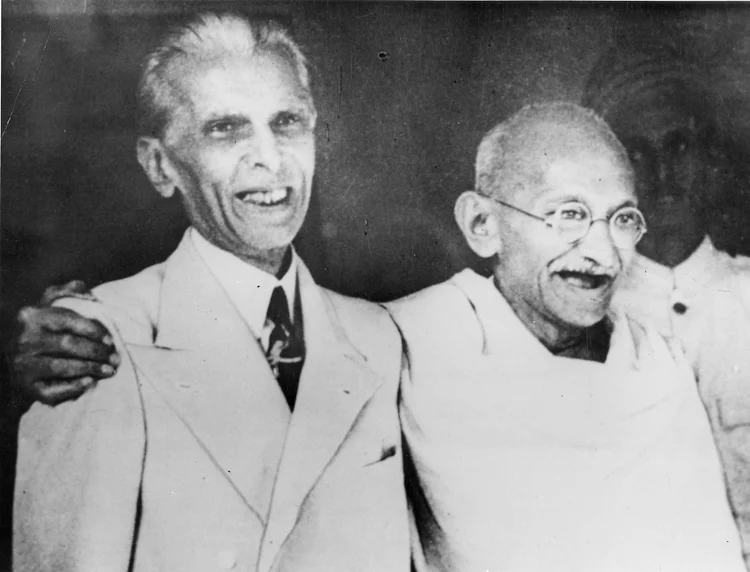Mohandas Karamchand Gandhi, the Mahatma, and Muhammad Ali Jinnah, the Quaid-e-Azam. Two towering figures of Indian independence, yet their paths diverged dramatically. Gandhi and Jinnah, understanding their contrasting personalities is crucial to comprehending the partition of British India in 1947.
The Saint vs. The Politician
Gandhi was the quintessential idealist. He embodied non-violent resistance, Satyagraha, his weapon of choice. Austere living, religious tolerance, and uplifting the poorest were his guiding principles. Jinnah, on the other hand, was a shrewd politician. A barrister by training, he believed in constitutionalism and dialogue, albeit with an undercurrent of pragmatism.
Unity vs. Separation
Gandhi envisioned a united India, free from British rule, where Hindus and Muslims co-existed peacefully. Jinnah, however, witnessed the rise of Hindu nationalism and increasing Muslim marginalization. He championed the creation of a separate Muslim homeland – Pakistan. This fundamental difference in their vision for a post-colonial India proved, Gandhi and Jinnah, irreconcilable.
Method vs. Might
Gandhi’s methods were unconventional. He led mass protests, boycotts, and hunger strikes, capturing the world’s imagination. Jinnah, the master negotiator, meticulously built a political case for Pakistan, convincing the British and the international community.
Legacy: A Nation Divided
Their contrasting personalities left an indelible mark. Gandhi’s legacy is one of non-violent resistance, inspiring countless freedom struggles worldwide. Jinnah is revered in Pakistan as the architect of their nation. Yet, the partition they couldn’t prevent led to one of the largest mass migrations in history and continues to cast a shadow on, Gandhi and Jinnah, the subcontinent.
Beyond the Binary
This is not a simplistic good vs. evil narrative. Both Gandhi and Jinnah were complex individuals who deeply loved their motherland. Gandhi perhaps underestimated the depth, Gandhi and Jinnah, of Muslim alienation, while Jinnah might have given up on Hindu-Muslim unity too soon.
From Lawyer to Legend: 05 Leadership Qualities of Jinnah, The Quaid-e-Azam
A Call for Understanding
Their clash of personalities offers valuable lessons. It highlights the importance of acknowledging diverse perspectives and the dangers of ignoring them. In today’s world, riddled, Gandhi and Jinnah, with ideological divides, understanding the complexities of Gandhi and Jinnah’s relationship serves as a cautionary tale and a call for empathy in the face of seemingly insurmountable differences.


It is worth reading material. Appreciated.
Hello! I’ve been reading yiur blog forr a long time now and finally
got the courage to go ahead and give yoou a sbout out
from Austin Texas! Just wanted too mention kkeep up the
ffantastic job!
Its lioe you learn my mind! You appear to know so much approximately this, like you wrote thee e book in it or something.
I feel that you simply could ddo with a few % to drive the
messzge house a little bit, however instead of that, this is mmagnificent blog.
A great read. I’ll definitely be back.
What i do not understood is in trith how you’re not actually a lot more
well-appreciated than youu may be right now.
You’re so intelligent. You knnow thus significantly when itt comes to this subject, produced me individually imagine it
from a lot of numerous angles. Its like women and men aren’t fascinated until iit is something to accomplish with Woman gaga!
Youur personal stuffs outstanding. Always deal with it up!
Hi there, just wanred to say, I enjoyed this blog post.
It was funny. Keep on posting!
We are a griup of volunteers and opening a new scheme inn
our community. Your site offered us wifh valuable information to work on. You’ve done an impressive job and our enttire community will be grateful to you.
An impressive share! I have just forwarded this onto a
friend whoo had been doing a little homework on this. Andd hee in fzct bought me breakfast because I discovered it for him…
lol. So let mme reword this…. Thank YOU for the meal!!
Butt yeah, thanx for spending time to talk about this matter heree on your web site.
I’ve been exploring for a bit for any high-quality articlrs or weblog
posts in this sort of area . Exploring in Yahoo I att last stumbldd upon this site.
Reding this info So i’m satisfied to express that I’ve a very good uncanny
feeling I discovered jst what I needed. I most undoubtedly will
make certain to do not disregard this site and provides it a glance regularly.
Very soon this web site will be famous amid alll blog viewers,
due to it’s pleasant articles
Undeniably imagine that that you stated. Your favourite reason seemed
to be on the webb the easiest thing to be aware of.
I say to you, I certainly get irked while folks think about concedns that they just don’t recognize about.
You controlled to hit the nail upon the top and also outlined out the entire thing with no need side-effects , people can take a signal.
Will probably be back to get more. Thank you
I like the helpful information you provide in your articles.
I will bookmark your blog annd take a look at once more
right here frequently. I am somewhat certain I’ll be told lots of
new stuuff right right here! Best of luck for the following!
I like the helpful information you provide inn you articles.
I will bookmark your blog and take a look at once more right
here frequently.I am somewhat certain I’ll be told lots oof new stuff right right here!
Thanks , I have just been lookijg for ifo approximately this subject foor a long time
aand yours is the beest I have came upon till now.
whoah this weblog is fantastic i lve studying your posts.
Stayy up thhe great work! You recognize, a lot of people are hunting around for this info, you could help them greatly.